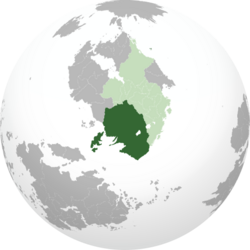Calderan Republic
Newfound State of Caldera ᎢᏤ ᎢᎦ ᏑᎾᏓᎴᎩ ᎨᏒ ᏴᏫ Caldera (Indigeno-Calderan) | |
|---|---|
Motto: Ceuldeland die geliebte ("Caldera the beloved") | |
Anthem: Neu Haus in Ceuldeland | |
 Location of XXX (dark green) In XXX (gray) | |
| Capital | Little Caldera |
| Largest city | Neu Berlin |
| Official languages | German Ænglish Indigeno-Calderan |
| Ethnic groups | 98.4% Indigeno-Calderan 1.2% German 0.4% Other |
| Religion | Christianity Native Polytheistic Volinity |
| Demonym(s) | Calderan (noun/adjective) Calderans (plural) |
| Government | One party democracy |
• Prime Leader | Karl Steinenkatz |
| Legislature | The House of the People |
| Establishment | |
• Establishment of the current People's Party | February 16th, 2030 |
| Area | |
• Total | 250 km2 (97 sq mi) (42nd) |
| Population | |
• Estimate | 10 million |
• Census | 10,019,538 |
| GDP (PPP) | 2030 estimate |
• Total | $135,277 billion |
| GDP (nominal) | estimate |
• Total | $52,000,000 |
• Per capita | $5,210 |
| Gini | 55 high |
| HDI (2030) | 0.8 very high |
| Currency | Calderan Piece (CLP) |
| Driving side | right |
Austro-Caldera (German: Ceuldeland), officially the Newfound State of Caldera, is a country in Crona. It is neighbored by Sabnaki. It's infamous for a ruling class of German speakers, while the majority of the population is of a Calderan culture.
Austro-Caldera is not a member of the League of Nations.
Etymology
Austro-Caldera was named by the first Ænglish explorers who came to the region. The first part of the word, austro, is derived from the Latin word australis, meaning southern. This refers to the fact that the island was south of the natives who inhabited the Northwestern part of Crona. The second part, caldera, is a reference to the island's most defining feature; a caldera.
History
Early Indigeno-Calderans
In the first century, Autro-Caldera was migrated to by natives around Crona. They developed slightly different than elsewhere in Crona, as these natives built their society around fishing.
Second era
What were the first political structures of your country? Did it have any very early rivals or was it controlled by a foreign country?
Third era
What were your country's first major moves on an international level?
Fourth era
Did your country ever have a period of significant decline or internal struggle?
Fifth era
Was your country subject to imperialism later in its life, or was it an imperial power?
Sixth era
How did the 20th century affect your country?
Geography
What is the general explanation of how your country exists within the world?
Climate and environment
Is your country hot or cold?
Government and Politics
How is your country ruled or governed?
Executive
Who is responsible for making high level choices in your country? Does it have a President or King?
Legislative
Who decides the laws for your country? Is there political parties and a legislature?
Federal subdivisions
How is your country divided? Are there states or provinces, or is the country directly governed from the capital as a unitary state?
Politics
What political factions exist? Who has ruled predominantly?
Law
What kind of laws and legal system does your country employ?
Demographics
What kind of people live in your country?
Ethnicity
What ethnic groups make up your country?
Language
What language or languages do your country's people use? Are there any previously used languages no longer common? Are these languages native to your country or shared with another?
Religion
Religious affiliations in the XXX (20XX)
What do your country's people believe in religiously, if anything? How many groups are there?
Education
How many people in your country are educated?
Culture and Society
What do your people do, and what are they like?
Education
What is your country's education system like? How do the schools work? What do people think about education?
Attitudes and worldview
How do your country's people view life?
Kinship and family
How are families or kinship groups structured in your country?
Cuisine
What do your people eat?
Religion
What do your people believe? Rather than demographics, as above, think about how important religion is to your people and their view about their own and other religions. What is the relationship between the prevailing view and minority religious groups? Is it an official religion, and do any laws exist about free worship?
Arts and Literature
What type of art do your people make? Do they have a tradition of painted art, well-crafted television shows, or great music?
Sports
Does your country have any major sports leagues? What types of sports are played, both professionally and for fun by your country's people?"
Symbols
Are there any prominent symbols which are well known to represent your country?
Economy and Infrastructure
How does your country's economy work?
Industries and Sectors
What are the largest parts of your economy in terms of what they do?
Currency
What exchange systems are used within your country's economy?
Healthcare
How do people in your country procure medical care? How is it paid for?
Labor
How is labor organized within your country? Are there any social institutions or unions which deal with labor concerns?
Transportation
How do people in your country get around? Is there a major highway system as well as sea- and airports?
Energy
What type of energy keeps your nation going? Are you renewable or use fossil fuels, and if you are renewable, how recently did your country transition?
Technology
How advanced is your country? Is it an innovator, or does it largely import new developments?
Military
How large is your country's military? Is it large but poorly equipped or small and elite? Does your country have a martial tradition?

